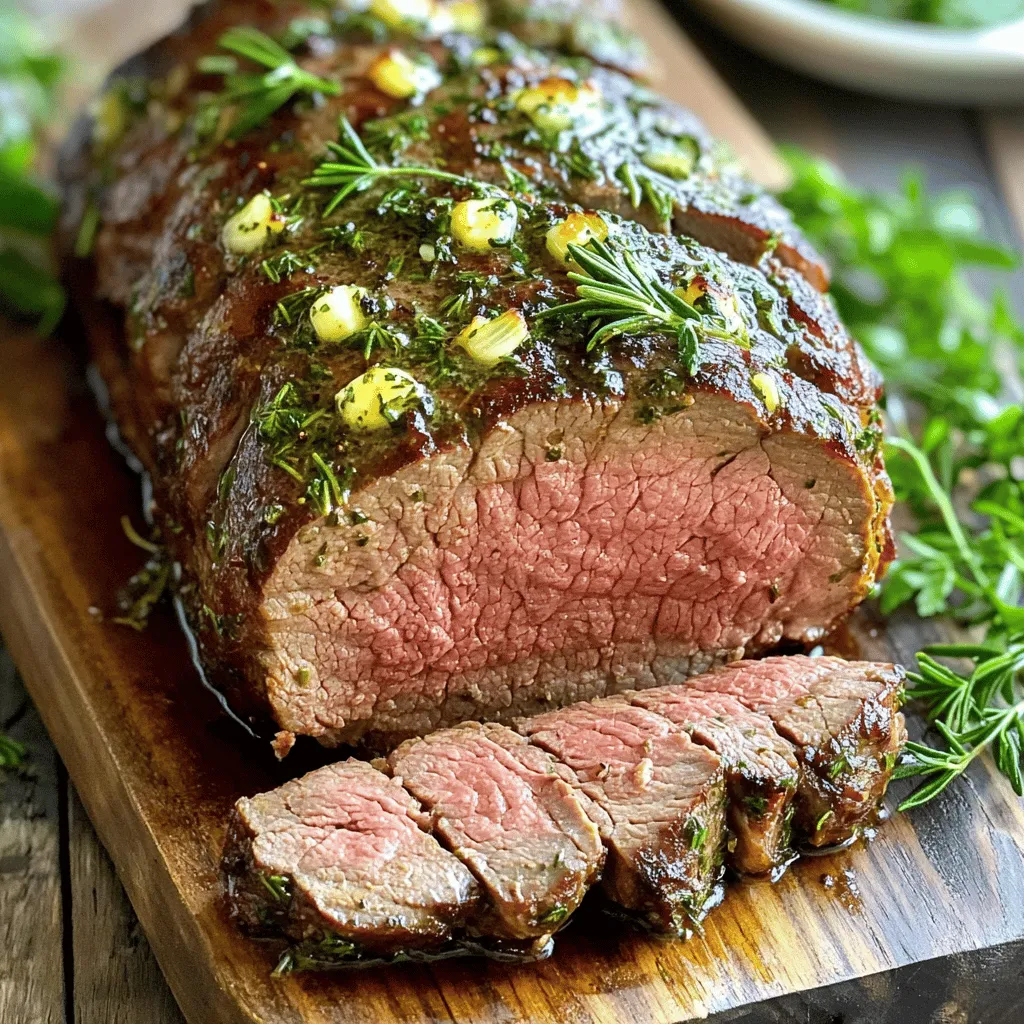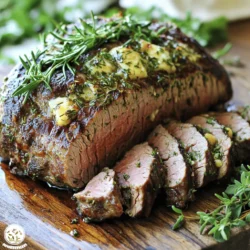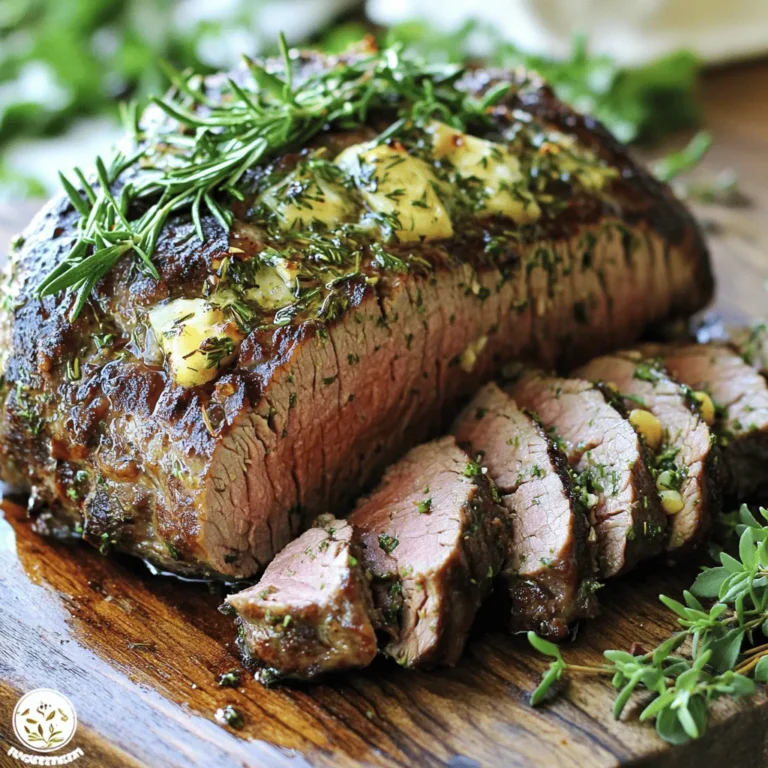If you want to impress your family or friends, this Herb Butter Beef Tenderloin Roast is your answer. With juicy meat and rich herb flavors, this dish is sure to shine at any table. I’ll walk you through each step, from making the tasty herb butter to perfect roasting tips. Ready to elevate your cooking game? Let’s dive right into creating a roast that everyone will rave about!
Ingredients
Main Ingredients for Herb Butter Beef Tenderloin Roast
– 2 to 2.5 lbs beef tenderloin roast
– 4 tablespoons unsalted butter, softened
– 3 cloves garlic, minced
– 2 tablespoons fresh rosemary, finely chopped
– 2 tablespoons fresh thyme, finely chopped
– 1 tablespoon fresh parsley, finely chopped
– 1 teaspoon salt
– 1 teaspoon black pepper
– 1 tablespoon Dijon mustard
– 2 tablespoons olive oil
You need these main ingredients for the best flavor. The beef tenderloin is the star. Choose a good cut for a tender roast. The herb butter adds a rich, savory taste.
Optional Garnishes
– Fresh herbs for garnish
Adding fresh herbs as a garnish makes your dish look great. You can use extra rosemary, thyme, or parsley. This simple touch enhances the dish’s visual appeal.
Recommended Tools and Equipment
– Large oven-safe skillet
– Mixing bowl
– Measuring spoons
– Meat thermometer
– Aluminum foil
These tools help you make the roast easily. An oven-safe skillet is key for searing and roasting. A meat thermometer ensures perfect doneness. Using these tools makes cooking smooth.
Step-by-Step Instructions
Preparing the Oven and Equipment
First, set your oven to 425°F (220°C). This high heat helps create a nice crust. Grab a large oven-safe skillet. You need it for searing and roasting the beef. Make sure to have a meat thermometer on hand. It helps check the roast’s doneness.
Making the Herb Butter
In a small bowl, mix 4 tablespoons of softened butter. Add 3 minced garlic cloves and 2 tablespoons each of chopped rosemary and thyme. Then, stir in 1 tablespoon of chopped parsley, 1 teaspoon of salt, 1 teaspoon of black pepper, and 1 tablespoon of Dijon mustard. Blend well until smooth. This herb butter adds rich flavor.
Searing the Beef Tenderloin
Take your beef tenderloin roast and pat it dry with paper towels. This step is key for a good sear. Heat 2 tablespoons of olive oil in the skillet over medium-high heat. When the oil is hot, place the tenderloin in the skillet. Sear each side for about 2-3 minutes. Look for a deep brown color, which gives great flavor.
Roasting the Beef Tenderloin
Once seared, remove the skillet from the heat. Generously spread the herb butter mixture over the tenderloin. Make sure it covers all sides. Then, transfer the skillet to the preheated oven. Roast for 25-30 minutes. For medium-rare, check that the internal temperature hits 130-135°F (54-57°C).
Resting and Serving
After roasting, take the skillet out of the oven. Cover the beef loosely with aluminum foil. Let it rest for 10-15 minutes. This step is important; it helps the juices stay in the meat. After resting, slice the tenderloin into 1-inch thick medallions. Plate them nicely and, if you like, garnish with fresh herbs. Enjoy your Herb Butter Beef Tenderloin Roast!
Tips & Tricks
Achieving the Perfect Sear
To get a great sear, dry the beef first. Use paper towels to pat it dry. This removes extra moisture. When the meat is dry, it browns better. Heat your skillet before adding the oil. The oil should shimmer, not smoke. Sear each side for about 2-3 minutes. You want a nice brown crust. This crust adds flavor and texture to your roast.
Cooking to Desired Doneness
For perfect doneness, use a meat thermometer. Insert it into the thickest part of the beef. For medium-rare, aim for 130-135°F (54-57°C). If you prefer medium, cook it until it reaches 140-145°F (60-63°C). Remember to rest the beef after cooking. This helps the juices stay inside. A rested roast is juicier and more tender.
Enhancing Flavor with Additional Herbs
You can mix in other herbs for more flavor. Try adding fresh sage or tarragon to the herb butter. These herbs bring a unique twist. You can also use dried herbs if fresh isn’t available. Just remember to use less, as dried herbs are stronger. Experiment with different combinations to find your favorite. Each herb adds depth to the dish, making it special.

Variations
Using Different Herbs or Butters
You can change the herbs in the butter mix to fit your taste. Try tarragon or chives for a fresh twist. You can also experiment with different butters. For a richer flavor, use garlic herb butter or truffle butter. Each choice gives a unique taste.
Cooking Methods: Roasting vs Grilling
Roasting gives a nice crust and locks in juices. You can roast your beef in the oven or on a grill. Grilling adds a smoky flavor and can be done on high heat. You get great grill marks and a lovely char. Whichever method you pick, keep an eye on the temperature. This helps you achieve that perfect doneness.
Serving Suggestions and Complementary Sides
Pair your beef tenderloin with sides that enhance its rich flavor. Roasted vegetables, like carrots and potatoes, complement the dish well. A fresh salad can add a nice crunch. You can also serve it with creamy mashed potatoes or buttery corn. These sides create a balanced meal and make your roast shine.
Storage Information
Storing Leftover Beef Tenderloin
After enjoying your herb butter beef tenderloin, you may have leftovers. Let the roast cool to room temperature. Wrap it tightly in plastic wrap or foil. Place the wrapped roast in an airtight container. Store it in the fridge for up to three days. This helps keep the meat moist and flavorful.
Reheating Tips
To reheat the beef tenderloin, preheat your oven to 250°F (120°C). Place the sliced beef in a baking dish. Add a splash of beef broth or water to keep it juicy. Cover the dish with aluminum foil. Heat for about 15-20 minutes until warm. You can also use a microwave, but this may dry out the meat. Heat in short bursts and cover it to retain moisture.
Freezing Instructions
If you want to save the leftover beef tenderloin for later, freezing is a great option. Wrap each slice in plastic wrap or foil. Place the wrapped slices in a freezer-safe bag. Remove as much air as possible to prevent freezer burn. You can freeze the beef for up to three months. When ready to eat, thaw in the fridge overnight before reheating.
FAQs
How do I know when the beef tenderloin is done?
Check the internal temperature with a meat thermometer. For medium-rare, it should be 130-135°F (54-57°C). If you don’t have a thermometer, press the meat. It should feel firm but slightly springy. The more you cook, the firmer it gets.
Can I make the herb butter in advance?
Yes, you can make the herb butter ahead of time. Just mix all the ingredients and store it in the fridge. Wrap it tightly in plastic wrap or put it in an airtight container. It will stay fresh for about a week. You can also freeze it for longer storage. Cut it into logs and freeze until you need it.
What are the best side dishes to serve with beef tenderloin?
Serve beef tenderloin with sides that complement its rich flavor. Here are some great options:
– Garlic mashed potatoes
– Roasted seasonal vegetables
– Creamed spinach
– Fresh salad with vinaigrette
– Baked macaroni and cheese
These sides bring balance and add color to your meal.
Where can I buy quality beef tenderloin and herbs?
Look for quality beef tenderloin at local butcher shops or farmer’s markets. They often have better cuts than standard grocery stores. Ask the butcher for recommendations. For fresh herbs, visit a farmer’s market or specialty grocery store. You can also grow your own herbs at home for the freshest flavor.
In this post, we explored how to make a delicious herb butter beef tenderloin roast. We discussed the key ingredients, tools, and step-by-step instructions. Tips covered achieving the perfect sear and cooking to your desired doneness. You learned about variations, storage, and answered common questions.
By following these steps, you can create a great meal. Don’t hesitate to try new herbs or sides to make it your own. Enjoy your cooking!


